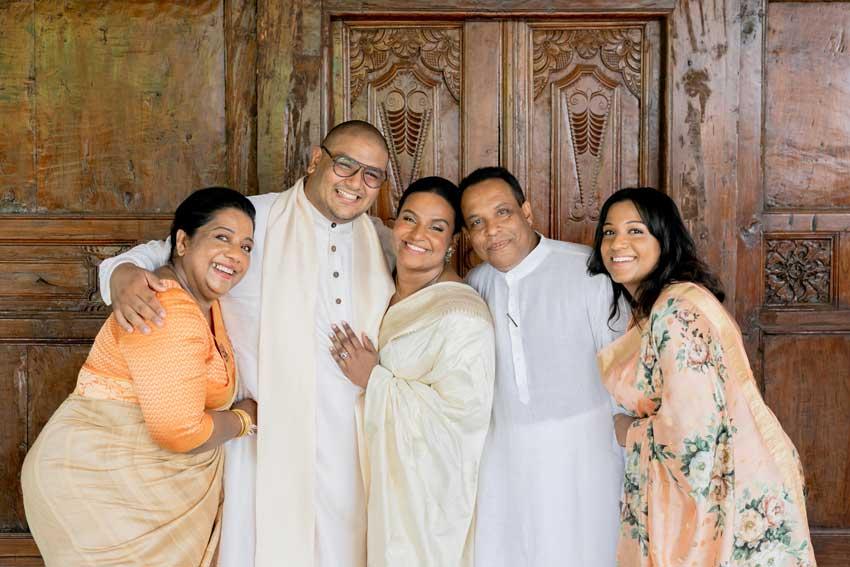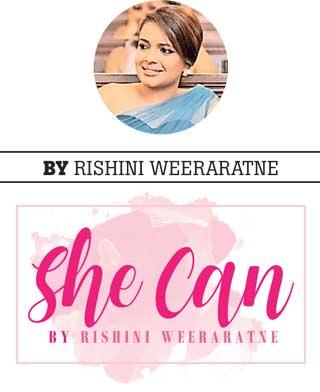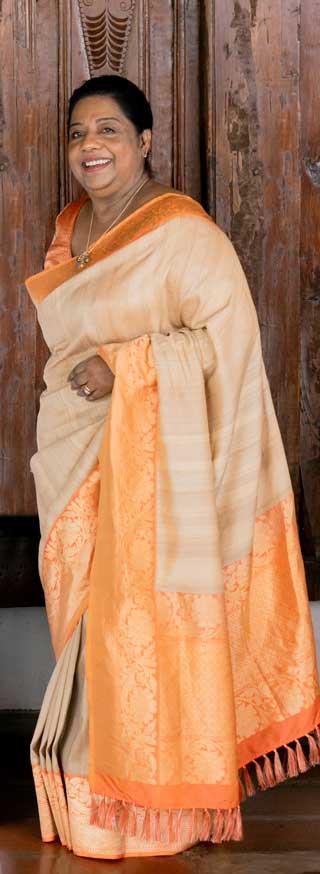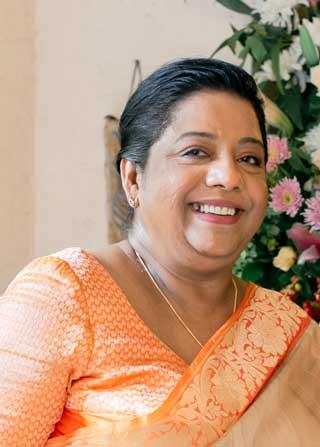Reply To:
Name - Reply Comment

 She is the Executive Director of Women in Need, Sri Lanka; an organization dedicated to eliminating all forms of violence against women and girls. Her passion for working towards the advancement of women, led her to quit her legal profession in order to advocate and address issues pertaining to violence against women. She is an Attorney-at-Law and a Former Member of the National Police Commission. She is a Former Member of the National Committee for Women and she was appointed by the Former President of Sri Lanka. In 2015, she was appointed as a Member of the Prime Minister’s Task Force, and from 2004 to 2006, she was a Member of the External Gender Consultation Group of the World Bank. She is an alumna of Bishops College, Colombo and Sri Lanka Law College.
She is the Executive Director of Women in Need, Sri Lanka; an organization dedicated to eliminating all forms of violence against women and girls. Her passion for working towards the advancement of women, led her to quit her legal profession in order to advocate and address issues pertaining to violence against women. She is an Attorney-at-Law and a Former Member of the National Police Commission. She is a Former Member of the National Committee for Women and she was appointed by the Former President of Sri Lanka. In 2015, she was appointed as a Member of the Prime Minister’s Task Force, and from 2004 to 2006, she was a Member of the External Gender Consultation Group of the World Bank. She is an alumna of Bishops College, Colombo and Sri Lanka Law College.
Under her leadership, WIN has expanded into a fully-fledged national organization, providing all crisis intervention services required by abused victims. The organization has eighteen centers across the island, which include, crisis centers, counseling desks in local police stations, multiple victim shelters across the island and women’s resource centers in two districts. She was the recipient of the SAARC ‘Woman of Excellence’ award, presented by the SAARC Women’s Association in Sri Lanka, and the Colombo Municipal Council award for ‘Outstanding Service to the Community.’ In 2012, she was awarded the UNFPA International Award for the ‘Health and Dignity of Women.’ This prestigious awarded was presented to just two women in the world, and she was awarded the same at a very high-profile formal event in New York, U.S.A. In April 2021, she was also the recipient of the International Lotus Leadership Award presented by the Lotus Circle, USA. Winning this prestigious award has been a career highlight for her, as previous awardees include Christine Amanpour, Dr Younus of Grameen Bank and the First Lady of Afghanistan, Rula Ghani. She launched a social enterprise titled ‘WIN for HER’ to economically emancipate women who are abused by their spouses, partners or male relatives. These perpetrators often use their economic status to cause harm, control and prevent women from leaving their abusive homes.
She is without a doubt the most passionate and the most effective Women’s and Child Rights advocate in the country. Her work has impacted the lives of thousands of women and children in Sri Lanka. She saves lives not just every week or every day, but every hour. She is fearless. She Can and she continues to advocate for positive change. She is a positive Sri Lankan leader who understands the importance of a free and equitable society, where all individuals can lead dignified lives irrespective of their race, religion, caste, gender or sexual orientation. She is a true Sri Lankan superhero, fighting injustice in a patriarchal society; Savithri Wijesekera.
 What are the most important attributions of a successful leader today? Successful leaders should have a clear vision for the organization; the way forward. They need to motivate everyone in their team. At Women In Need (WIN), one needs to have commitment, passion and a genuine love to help people. As a leader, I believe you need to stand firm in your judgment and trust your sense of direction, balanced with humility. It is also important to balance and manage your emotions, as at times there are tough decisions to be made. At an organization like WIN, we are constantly challenging the norms and beliefs pertaining to gender biases, hence it’s imperative that we lead with conviction and courage. It is also important to regularly connect with the team and facilitate open communication, and to always consider their ideas and opinions. A good leader also needs to be kind, empathetic and understanding, whilst also being strong and firm.
What are the most important attributions of a successful leader today? Successful leaders should have a clear vision for the organization; the way forward. They need to motivate everyone in their team. At Women In Need (WIN), one needs to have commitment, passion and a genuine love to help people. As a leader, I believe you need to stand firm in your judgment and trust your sense of direction, balanced with humility. It is also important to balance and manage your emotions, as at times there are tough decisions to be made. At an organization like WIN, we are constantly challenging the norms and beliefs pertaining to gender biases, hence it’s imperative that we lead with conviction and courage. It is also important to regularly connect with the team and facilitate open communication, and to always consider their ideas and opinions. A good leader also needs to be kind, empathetic and understanding, whilst also being strong and firm.
In your opinion do you think Women in Sri Lanka can achieve gender equality in the workplace and society during your lifetime? It will be a dream come true for me! At WIN, we daily battle issues pertaining to gender equality in society. I have been working at WIN for over twenty-five years, and I realize even today, how difficult it is to change people’s attitudes! Do you realize that all discriminatory practices and beliefs in society are ninety-nine percent gender discriminatory towards women? The emotional, sexual and psychological stereotyping of women begins when the doctor says, “it’s a girl.” Do people really sit down and think about it? When someone is raped, the first thing people want to know is if she was wearing a short-dress or a revealing neckline! People don’t think of the trauma, shame emotions or the psychological abuse and trauma of the victim. We have been taught to believe that it is mainly her fault. Hence, how can we have gender equality if majority of us Sri Lankans think in this manner. I have heard thousands of stories where the woman subject to abuse goes to the Police station to make a complaint, after much thought, and ten years of abuse, and the reaction of the Police Officer, very often, is that she should go back to her husband, as after all he’s her husband and he can beat her if he wants. Where is justice for women in Sri Lanka? Most of the women subjected to sexual harassment in work places don’t want to take action, as they find it difficult to prove harassment, and many are not willing to support the victim. Also, the stigma and shame is always on the victim. There is a slight change in gender attitudes amongst the younger generation, but it will probably take another century to achieve gender equality in Sri Lanka. As you know, culture and tradition is what people hide behind to control women and girls, but we need to rise up and speak against discrimination and gender stereotyping.
What is the most dangerous part of the work you do? Saving lives. The women and girl victims we see daily are subject to numerous forms of physical and mental abuse. Some, badly tortured and abused, while some not so visibly abused. The severe cases need a lot of support. They need shelter, psychological support, legal help, medical help and safety. And usually, these women or girls have very violent partners or husbands. They sometimes storm into office demanding we handover the wife or partner to them, and if not, they will threaten to smash the office down, or some have even threatened to kill us all. When such incidents occur, Counselors, Lawyers and the Shelter Staff are really worried and scared, but I try to remain calm and collected, in order to give them the strength and security, and also to swiftly find the best solutions to protect us all. Although, I will not show my fear, I know there is immense danger. We have had several occasions where they have broken our doors and windows in the night. I have always reassured my staff that we don’t have to fear because we are saving someone’s life. If necessary, we will call the Police. Even in our regional offices we have had threats. I recall, on one occasion, the perpetrator husband and his mother came and threatened us and said that they will get the office closed and we won’t be able to function anymore. I, of course, very calmly, asked them both to leave if not we will ask the Police to come and arrest them. I, sometimes subtly threaten them, if they are very violent and unreasonable. I have to always show a brave face and appear to be unshaken even at the most dangerous of times. Many people don’t realize and understand the danger our staff has to face regularly.
 What kind of support do you require in order to successfully continue your work? As a Non-Governmental Organization and a non-profit, every day is a challenge. From the day WIN started over thirty years ago, it has been a struggle. The biggest challenge is the gender stereotyping that is prevalent in society. The gender biases prevalent in society has to have an attitudinal change with the support of Media and Policy-Makers. They need to champion issues like Domestic Violence and Sexual Harassment to change attitudes and beliefs in society. We also work very closely with the Police and need constant support to collaborate in protecting the rights and lives of women and girls. It is also important for law enforcement agencies to accept and support us in our work, to reduce violence against women in society. This is an issue that affects many women and girls in Sri Lanka. Therefore, we need to take it very seriously. All Stakeholders and Policy-Makers should be role models to speak out about these violations, as Human Right violations against women and girls. Most of these violations happen because of the vulnerability of the women and girls. The crisis intervention support services we provide to victims and survivors of violence is sometimes life threatening, hence we need support from the Police, Public Healthcare Workers, and ground level support from the community and Grama Niladharis. This will support our work and make it easy for the victim too. We also have a huge challenge in raising funds to provide these services free of charge to the victims. WIN provides psychological counseling, legal services, temporary shelter, a 24-hour hotline and a mobile App 2six4. We try to raise funds in the private sector but it has been very challenging and disappointing. Hence, WIN is very donor dependent, as we consider our services essential to women and girls who are constantly subject to numerous forms of violence.
What kind of support do you require in order to successfully continue your work? As a Non-Governmental Organization and a non-profit, every day is a challenge. From the day WIN started over thirty years ago, it has been a struggle. The biggest challenge is the gender stereotyping that is prevalent in society. The gender biases prevalent in society has to have an attitudinal change with the support of Media and Policy-Makers. They need to champion issues like Domestic Violence and Sexual Harassment to change attitudes and beliefs in society. We also work very closely with the Police and need constant support to collaborate in protecting the rights and lives of women and girls. It is also important for law enforcement agencies to accept and support us in our work, to reduce violence against women in society. This is an issue that affects many women and girls in Sri Lanka. Therefore, we need to take it very seriously. All Stakeholders and Policy-Makers should be role models to speak out about these violations, as Human Right violations against women and girls. Most of these violations happen because of the vulnerability of the women and girls. The crisis intervention support services we provide to victims and survivors of violence is sometimes life threatening, hence we need support from the Police, Public Healthcare Workers, and ground level support from the community and Grama Niladharis. This will support our work and make it easy for the victim too. We also have a huge challenge in raising funds to provide these services free of charge to the victims. WIN provides psychological counseling, legal services, temporary shelter, a 24-hour hotline and a mobile App 2six4. We try to raise funds in the private sector but it has been very challenging and disappointing. Hence, WIN is very donor dependent, as we consider our services essential to women and girls who are constantly subject to numerous forms of violence.
How do you move forward when everyone kept telling you that your suggestions or ideas don’t work? Initially, my work was not considered to be ‘work of any importance.’ Along the road of expansion of WIN, many thought WIN would collapse in a few years, as we would not be able to sustain providing support services free of charge. But I was very careful and the expansion of services was very slow, and with a clear vision to do only things we could handle. I was always determined to take WIN forward regardless of the challenges we faced. My team was always supportive, dedicated and committed to continue working at WIN despite the low salaries. They always encouraged me and supported me. Working on the issue of Violence Against Women is a challenge, most of our ideas are novel and innovative. Hence, at WIN we always moved forward with our ideas, despite all the negative third-party comments.
What is your ‘why’? My biggest ‘why’ is why can’t society understand the mental trauma and emotional abuse suffered by a victim of domestic violence. Why is the man she has loved and is still in love with, now abusive towards her? Why do men treat their wife’s, partner’s or girlfriend’s so differently from the way they treat their mother’s, sister’s or grand-mother’s? Most women don’t want to talk about their physical or mental abuse for a long period of time. They only come out with it if they can’t face it any longer. The shame and stigma is primarily in their minds. I, at times, ask myself why do they go back to their very violent partners? But they often do as they have no place to go, no income, no family support, and most importantly they don’t want to lose their children. Sexual harassment victims don’t want to report the abuse owing to the shame and embarrassment they feel. And I ask myself why? Why the gender difference for men and women in times we speak of equality.
Your biggest regret? I have no personal regrets. I love my work, and I love my team at WIN. My only regret is that WIN is not given the recognition it deserves for all the hard-work we have tirelessly done for over twenty-five years. We also don’t have the finances to spread our services to other parts of the country, and this upsets me. It’s also sad to note that most people don’t understand the severity of the problem that is prevalent in Sri Lanka. The Policy-Makers and Rulers don’t understand the issues that over eighty percent of women go through.
What is your biggest fear and how do you manage it? My biggest fear is that we might not have sufficient funds to carry on our crisis intervention essential support services. If we cannot offer them shelter services to protect them, what would happen to all these women and girls? Will they be killed or will they go insane with the long periods of abuse and trauma? WIN supplements these crisis services which is really the responsibility of the State. If the State recognizes the credible services provided by WIN and supports the organization, we can also focus on other important areas like education and campaigns to generate awareness about Gender Based Violence in Sri Lanka.
Where do you see yourself ten years from now? Chilling, relaxing and enjoying my retirement. I hope I might be able to do some travelling and enjoy my free-time with my family and close friends. I also hope I will be able to see a steady growth of WIN, where our services can be expanded across the island.
Share with us a secret no one else knows? I have no secrets in my life. My friends always say that I am like a mirror; what you see if what you get!
What woman inspires you and why? My mother; she always preached that we must serve the most vulnerable people whenever we can. She was a woman who was a socialist and believed in socialism. Whilst, growing up I watched her being involved in all kinds of Women’s Movements. She was one of the Founders of WIN. In 1988, she got me to volunteer legal services at WIN. This was the start of my journey at WIN. I am also a great fan of Oprah Winfrey, as she has brought many challenging issues up for discussion. I wish we can have a strong fearless lady like her in the media, who can bring up all these issues that women and girls face.
How do you want to be remembered one day? “You must be the change you wish to see in the world,” Mahatma Gandhi. I wish I can be remembered as a change-maker in Sri Lanka pertaining to Gender Equality and Gender Based Violence. As an individual who positioned the issue of GBV as a priority discussant issue at all levels in society.
“Happiness isn’t something that is achieved. It is a skill that’s cultivated and practiced daily and its specialty comes from serving others,” Chinese proverb.